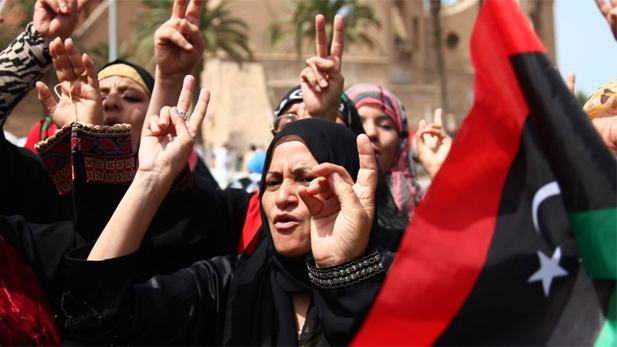 Libyan women played important roles in the rise against Gadhafi's regime.
Libyan women played important roles in the rise against Gadhafi's regime.One year ago, demonstrations broke out in central Tunisia at the funeral ceremony for a young fruit vendor who had died after setting fire to himself when provoked by a confrontation with local authorities. Protests quickly spread throughout Tunisia and then to Egypt, Yemen, Libya, Syria, and elsewhere. Hundreds of thousands of people took to the streets protesting against repressive governments and calling for economic opportunity. The Egyptian, Tunisian, and Yemeni leaders were forced to step aside, and Libya's Moammar Gadhafi was slain by rebels after a six-month civil war. Syria's President Bashar al-Assad now risks a similar fate as the violence in his country continues to intensify.
NPR's foreign desk examines the repercussions of the Arab Spring in a six-part series, beginning Monday, January 2, on Morning Edition.
The Arab Spring: Cairo
Monday, January 2 , Morning Edition
The Arab Spring brought the fairest elections in decades to Egypt and Tunisia, but those polls have not been without problems. Long-suppressed Islamists groups garner the most votes in both countries, creating friction with the liberals who led the street protests and who fear the Islamists threaten the very freedoms they fought for. Soraya Nelson reports from Cairo.
The Arab Spring: Tripoli
Tuesday, January 3, Morning Edition
In the wake of the Arab Spring uprisings, Islamist groups demonstrated their power at the ballot box. In Tunisia, Egypt and Morocco, long-established Islamist groups like the Muslim Brotherhood garnered the most votes in parliamentary elections. After the overthrow and murder of Moammar Gadhafi, these groups can operate freely for the first time. The ripple effects of these organizations activities have wide impact on a region in upheaval. Lourdes Garcia Navarro reports from Tripoli.
The Arab Spring: Syria
Wednesday, January 4, Morning Edition
The Syrian regime has consistently blamed the 10-month-old anti-government uprising on what it terms "armed gangs of terrorists and Islamist militants." Syrian state television also portrays the demonstrations as a danger. Will the Syrian uprising reopen sectarian conflict in the region? Deborah Amos reports on the Syrian crisis from neighboring Lebanon.
The Arab Spring: Bahrain
Thursday, January 5, Morning Edition
The least successful of the uprisings occurred in the small Persian Gulf island of Bahrain. After nearly a month of massive popular protests, troops from neighboring Saudi Arabia rolled into Bahrain and the resident monarchy was able to impose martial law. Few journalists could enter, but NPR's Kelly McEvers made several trips to the island during and after the uprising. McEvers reports on Bahrain's brutal government crackdown.
The Arab Spring: Turkey
Friday, January 6, Morning Edition
The Arab Spring's political upheaval thrust Turkey into the international spotlight. As U.S. and European influence wanes, Turkey's Recep Tayyip Erdogan is greeted like a hero on Arab streets. Meanwhile, Turkish businesses fret as lucrative investments in Libya and Syria are jeopardized. How prepared is Turkey to fill the power vacuum in a changing Middle East?
The Arab Spring: The U.S.
Monday, January 9, Morning Edition
Is the "Arab Spring" movement good or bad for the U.S.? It may be too soon to tell, but pose that question to Middle East analysts and foreign policy experts, and opinions break down along ideological lines. NPR's Deborah Amos takes a look at the regional winners, Turkey and Qatar, and the risks for the U.S. as the region struggles to redefine itself.
The Arab Spring Series beginning Monday, January 2, on NPR’s Morning Edition


By submitting your comments, you hereby give AZPM the right to post your comments and potentially use them in any other form of media operated by this institution.